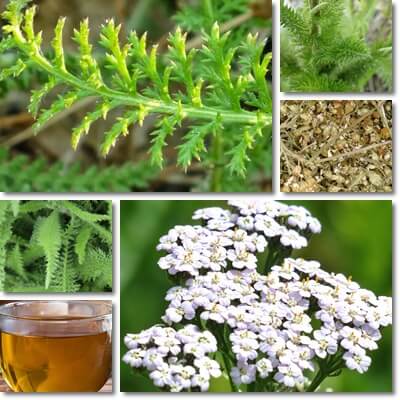Yarrow tea is a healthy herbal tea and a source of important benefits for health. The bitter medicinal tea is known for its anti-bleeding action, and favors female reproductive health, with a focus on improving dysfunctional uterine bleeding and managing fibroids symptoms in women of childbearing age and after menopause. Yarrow tea is good for anxiety and insomnia, exerts anti-hypertensive benefits and anti-inflammatory and antispasmodic effects, among other therapeutic uses.
What is yarrow?
Yarrow is a flower, weed and medicinal plant in the daisy or sunflower family. The scientific name for yarrow is Achillea millefolium. The first part of the scientific name, Achillea, is derived from the name of the almost invincible Greek warrior Achilles, hero of the Trojan war, a hint at the plant’s long history of being used to treat soldiers on the battlefield to stop bleeding from wounds. The second part of the scientific name refers to the many feathery leaves of the plant and literally translates to ‘a thousand leaves’. Yarrow can be found in North America, Europe, Asia, even Australia and New Zealand.
Find out more about yarrow.

What parts of yarrow are used medicinally?
All parts of the yarrow plant can be used medicinally. More commonly, yarrow flowers, leaves and sometimes also stems are used. Yarrow tea can be made exclusively from the dried white or pink flowers, or from dried flowers and leaves, even stems. The tea is available as loose plant material, or as tea bags which you can buy at the supermarket or health food stores in your area, or online. Alternatively, you can find loose yarrow tea for sale at farmers’ markets, or even forage for the plant yourself if it grows near you.
What does yarrow tea look like?
Yarrow tea ranges in color from a very light, almost clear amber color to a greenish brown to a dark orangey brown, depending on the plant parts used and the concentration of plant material in the tea. Just the dried flowers, or dried flowers and the feathery leaves, sometimes also thinner stems, may be used to make yarrow tea.
What does yarrow tea taste like?
Yarrow tea has a straightforward bitter, herbal, almost medicinal taste with an earthy aroma and mild astringency. The tea is quite pungent, with almost spicy notes. Using less plant material than recommended per cup and reducing infusion time can help make the tea taste less bitter. Conversely, you can make the tea more concentrated and let it steep for longer which will result in a more bitter taste, but also an increase in its medicinal properties.
The taste of yarrow tea can be improved by adding fresh lemon, lime or orange juice, lemon or orange peel, different raw honey varieties, cinnamon, anise or other spices, or just plain sugar.
You can also pair it with lemon tea or orange tea, raspberry fruit or raspberry leaf tea, or any other tea of your choice for both an improved flavor profile and an increased therapeutic action.

Yarrow tea benefits for health
Anti-bleeding effect
The yarrow plant is best known for its anti-bleeding properties. Yarrow tea contains achilleine, archilletin, achilleinetannins, achimilic acids, astringent tannins and other chemical constituents which demonstrate hemostatic effects. Consumption of the tea initiates and shortens blood coagulation, as well as triggers the contraction of tissues and blood vessels, contributing towards stopping bleeding.
Yarrow for abnormal bleeding in women
Abnormal bleeding in women includes everything from excessive bleeding to spotting to bleeding outside of the menstrual cycle to other types of dysfunctional uterine bleeding. Biologically active chemicals in the yarrow plant and its preparations exert an anti-bleeding action via antispasmodic, astringent and blood coagulating properties.
Natural remedy for uterine fibroids
Yarrow tea has long been consumed as a natural remedy for the management of uterine fibroids symptoms. Uterine fibroids are benign tumors, or growths, that appear in the uterus. They usually occur in women during their childbearing years, or after menopause, and cause dysfunctional bleeding, heavy bleeding during menses, or painful cramps during menstruation (dysmenorrhea), among other symptoms. Drinking yarrow tea daily is reported to help with bleeding and other symptoms of uterine fibroids.
Natural remedy for painful muscle cramps
Yarrow tea is a known antispasmodic, that is, it helps calms muscle spasms and alleviate associated pain. Yarrow tea is good for painful stomach cramps due to indigestion and stomach distension caused by excess gas, painful menstrual cramps in primary dysmenorrhea, and painful muscle cramps owed to injury and inflammation.
Good for kidney health and UTIs
Yarrow tea has natural diuretic properties, increasing urine output and promoting urine elimination. Its diuretic effects contribute to kidney health by maintaining normal kidney function and help combat and prevent urinary tract infections. Constituents in the tea with antibacterial properties further contribute to preventing UTIs.
Mild benefits for high blood pressure
Drinking yarrow tea in moderation has indirect benefits for hypertension. Yarrow tea stimulates urine formation and elimination, helping regulate blood volume and eliminate excess sodium which helps lower high blood pressure numbers.
Natural anti-inflammatory
Yarrow is known for its anti-inflammatory properties. For one, the plant and its preparations such as yarrow tea exert an antispasmodic action which relieves pain in muscles, including stomach pain, menstrual pain and painful muscle cramps. Moreover, yarrow contains biologically active constituents such as chamazulene which demonstrate in vivo anti-inflammatory effects.
Lowers fever
Drinking yarrow tea has a diaphoretic action, inducing sweating which helps bring down body temperature and reduce fever.
Natural remedy for insomnia
Drinking yarrow tea at night is reported to help induce calm and relaxation, exerting a sedative effect that helps trigger and maintain sleep. The benefits of yarrow tea for insomnia can be explained by the presence of natural constituents with anticholinergic effects which exert an anti-stimulant action that is conducive to restful sleep. However, talk to your doctor first about introducing yarrow tea to your bedtime routine because constituents in the plant can interact with sedatives and other medication used to treat insomnia.
Anti-anxiety effects
Yarrow tea is a good natural remedy for anxiety. Biologically active constituents in the tea exert various therapeutic actions with anxiety-relieving results, including:
- a muscle-relaxing action on smooth muscles in the circulatory and respiratory systems;
- antispasmodic properties with anti-inflammatory and pain-relieving benefits;
- anticholinergic properties with a sedative effect at the level of the nervous system, conducive to relaxation and favoring restful sleep;
- an anti-hypertensive action that brings down high blood pressure numbers.
Yarrow tea side effects and risks
- Allergic reactions. As a member of the daisy family, yarrow is a common allergen. Anyone allergic to ragweed, chamomile, chrysanthemums, dandelion, thistle etc. should avoid yarrow tea for fear of triggering an allergic reaction with the potential for anaphylactic shock.
- Skin rash. Handling yarrow tea material can cause allergic dermatitis, essentially a skin rash, in anyone allergic to the plant or related plants in the same family as yarrow.
- Pregnancy side effects. Consumption of yarrow tea is advised against during pregnancy due to yarrow’s effects on the female reproductive system. Risks: the possibility of a miscarriage.
- Medicine interactions. Yarrow tea can interact with anticoagulant medication, antacids, proton pump inhibitors and other medication used for treating gastritis, acid reflux disease (GERD) or peptic ulcers, but also sedatives, antidepressants and more.
- Reduced male fertility. Taking yarrow as tea or other preparations has been found to exert a toxic effect and reduce male fertility.
